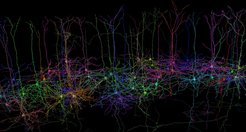Form follows function
Göttingen computer scientist and brain researcher receives ERC Starting Grant of 1.5 million euros
Computer scientist and brain researcher Prof. Dr. Alexander Ecker from the University of Göttingen and the Max Planck Institute for Dynamics and Self-Organization (MPIDS) has received a Starting Grant from the European Research Council (ERC). The ERC is thus supporting his project "Deep Neuron Embeddings: Data-driven multi-modal discovery of cell types in the neocortex" for five years with a total of 1.5 million euros. Ecker and his team want to find out how the form and function of neurons in the cerebral cortex are related.
A complex analysis thanks to new methods

"Form follows function" - this credo, which later served as a principle for the Bauhaus style, was coined by architect Louis Sullivan at the beginning of the 20th century. He considered it a universal law of nature. "Whether this also applies to the brain, however, is currently unknown," says Ecker, describing the background to his work. "For example, it is not yet clear how exactly the shape and function of the nerve cells in the cerebral cortex are related." Thanks to new scientific methods, Ecker and his team can now address this question. For a long time, it was only possible to determine either the shape or the functional activity of a nerve cell, but not both at the same time. The research group now wants to take up this challenge. The complex wiring patterns of the nerve cells also play an important role. Since, for example, a large number of stimuli are processed and interconnected during sensory perception, complex mathematical models are necessary to describe them. A large data set will help analyze the form and function of nerve cells: The team is drawing on data from a previous collaboration under the US Brain Initiative, which includes the anatomy and activity of about 100,000 neurons in the visual cortex of a mouse.
With the help of the ERC funding, the scientists plan to develop machine learning techniques to mathematically describe these neurons, recognize patterns in these data, and correlate their form and function.
Working together to achieve the goal

Such a challenging undertaking can be made possible thanks to the the interaction of the various research institutions at the Göttingen Campus. Ecker has been Professor of Data Science at Göttingen University since 2019 and is also a Max Planck Fellow at the Max Planck Institute for Dynamics and Self-Organization. At Göttingen University, he works at the Institute of Computer Science and is a member of the Campus Institute Data Science (CIDAS), the interface for collaboration in the field of Data Science at the Göttingen Campus.
Ecker completed his computer science studies at the University of Tübingen, followed by a PhD in a collaboration with Baylor College of Medicine in Houston (USA) and subsequent work as a group leader, also in Tübingen.
With the ERC Starting Grants, the European Union supports outstanding young researchers in building their further scientific careers. The funding is intended to enable them to develop an independent scientific profile and pursue innovative ideas.

